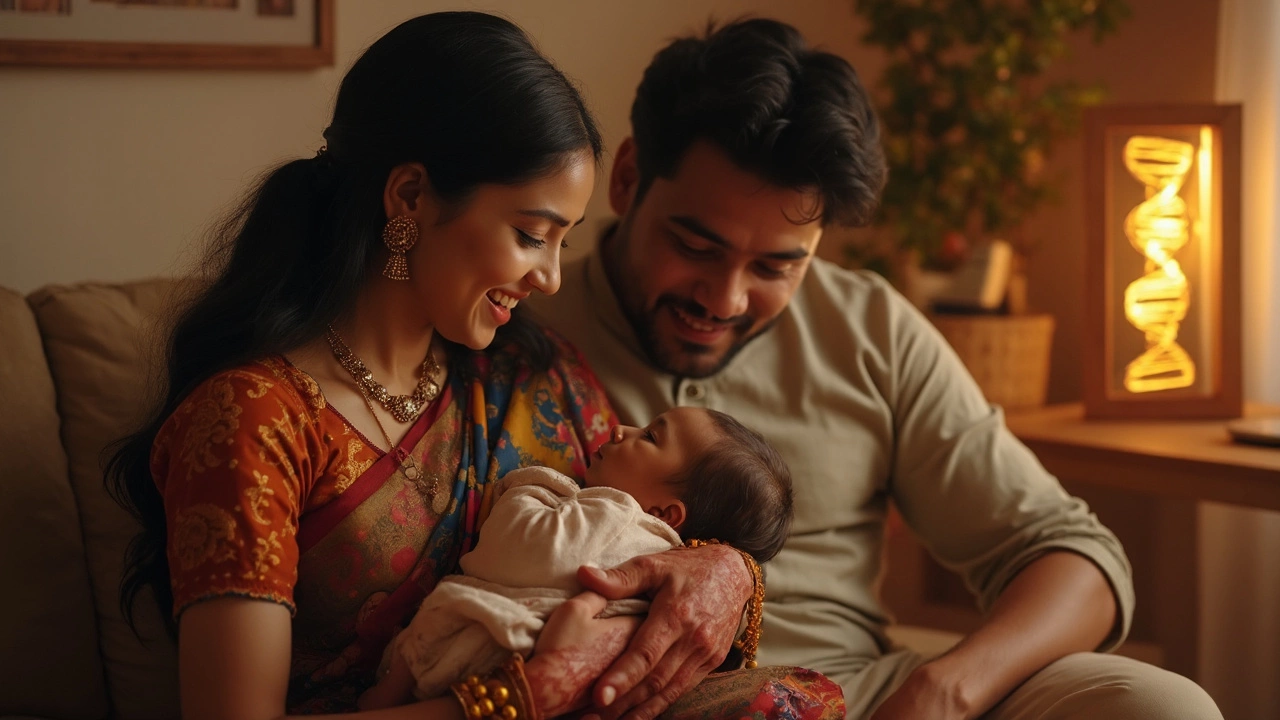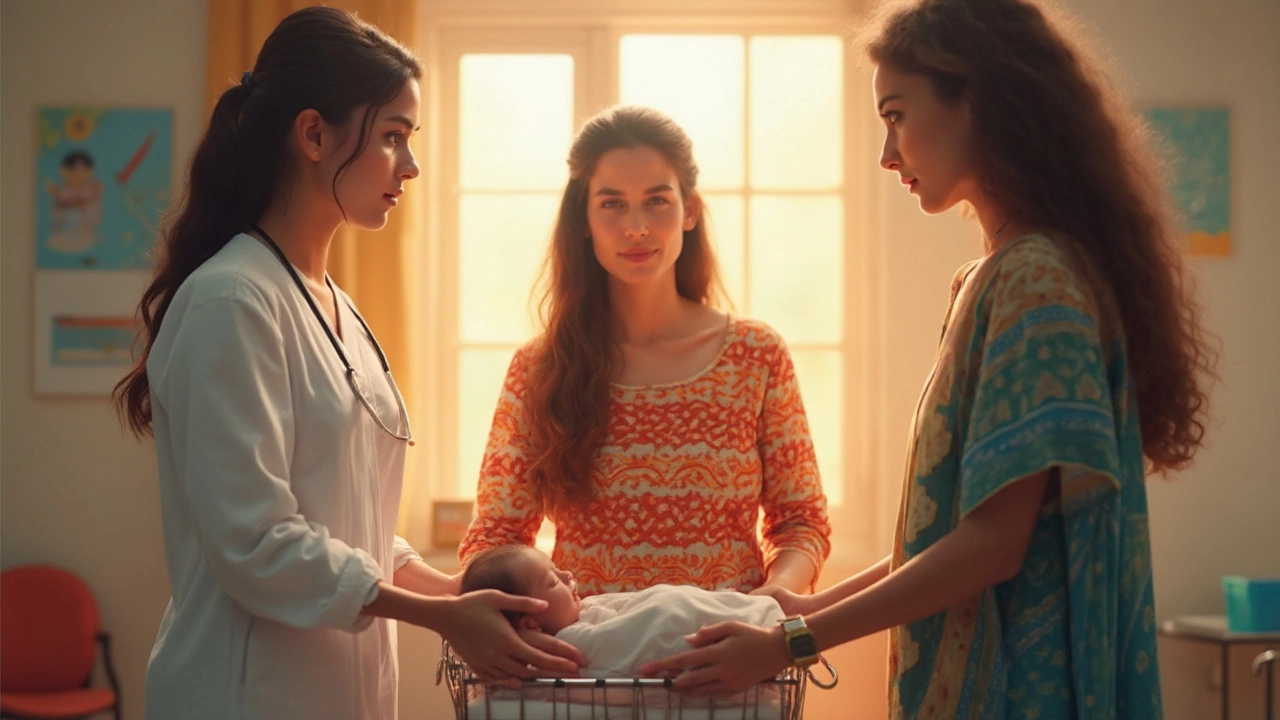Who Is the Real Mother of a Donor Egg Baby? IVF Truths You Need to Know
 Jun, 22 2025
Jun, 22 2025
Imagine going through the emotional ride of IVF, but with an extra twist—the egg you're using isn't yours. People ask: "Who’s the real mother here?" Sounds simple, but the answer goes way beyond biology.
The woman who donates the egg gives half of the baby’s DNA. The woman who carries the baby grows it in her womb, feels the kicks, and handles morning sickness. Sometimes, these are two different people. When you mix in law, emotions, and even what doctors say about bonding, things start to look a lot less black-and-white.
This isn’t just a question for trivia night—it’s practical for real families thinking about their next step with IVF. It’s also huge if you’re talking to extended family or explaining your family story to your future child. If you’re wondering how motherhood is defined in the world of donor eggs, it helps to get the facts straight—and know what really matters in day-to-day life.
- Genetics vs. Gestation: Breaking Down the Basics
- Legal and Emotional Rights of Motherhood
- What Research Says About Bonding and Biology
- Tips for Families Using Donor Eggs
Genetics vs. Gestation: Breaking Down the Basics
The whole question about "who is the real mother?" in IVF using donor eggs comes down to two things: genes and pregnancy. The donor provides the genetic material—the egg that contains half of the baby's DNA. The recipient, or the woman who carries the pregnancy, provides the environment and support from the moment the embryo implants until birth. Both roles are huge, but they’re different in big ways.
Biologically, the donor egg gives the baby their genetic blueprint. Eye color, hair type, height—the building blocks all start here. But, that’s not the end of the story. The woman carrying the baby literally shapes how those genes get turned on or off. Nutrition, health, stress—all these factors influence the baby in the womb. Did you know that some studies show even the mother’s environment can affect how certain genes are expressed? This is called epigenetics, and it’s a pretty big deal in IVF science right now. So, both women have a real impact.
Here’s a quick breakdown of who does what during a donor egg IVF cycle:
- Egg Donor: Supplies the egg. Her genetic info goes into the embryo.
- Intended Mother (the one carrying the baby): Grows and nurtures the baby. Her health, hormones, and body create the environment for the baby’s development.
If we stack genetics and gestation side-by-side, the facts look like this:
| Aspect | Egg Donor | Birth Mother |
|---|---|---|
| Provides DNA? | Yes (50%) | No |
| Carries Pregnancy? | No | Yes |
| Shapes Early Development? | Limited (only genes) | Yes (all pregnancy factors) |
| Legal Mother (most countries) | No | Yes |
Bottom line: Both genetics and gestation matter in their own ways. The science behind it is clear—the donor gives DNA, while the birth mother shapes every single moment of the baby’s growth before birth. Knowing the facts helps families feel more confident about their choices and their role in their child’s life.
Legal and Emotional Rights of Motherhood
When you use a donor egg during IVF, the big question is: who has the right to call herself the mother? Legally, things are pretty clear in most places. The woman who gives birth to the baby is usually listed as the legal mother, no matter where the egg came from. That name goes on the birth certificate. In countries like the US, UK, and Australia, laws say the egg donor has no legal claim to the child. She signs away any rights up front, and her only role is the genetic contribution. The mom who carries and delivers the child is the legal mom, full stop.
Things get more interesting when you talk about the emotional side. Being a parent isn’t about whose DNA the kid has—ask any adoptive parent. The person raising, caring for, and loving the child is the one who becomes the mom in practice, day in and day out.
“Motherhood is built on much more than genetics or birth. Nurture, presence, and connection shape the real foundation of a parent-child bond.” — American Society for Reproductive Medicine
It can feel weird knowing you’re not genetically related to your child, but research shows that doesn’t get in the way of strong bonding. If you’re the one up at 3 am, soothing a crying baby, you’re doing the real work of being a parent. Plenty of donor egg moms say they eventually forget the genetic piece entirely as their routines and memories pile up.
- The egg donor’s rights are over before the embryo transfer even happens. No worries about her changing her mind later.
- The mom who gives birth makes all the legal and medical decisions for the baby, just like any other mom.
- Talking openly about donor egg IVF can help if questions pop up from family or, later, from your child.
So while genetics play a role in science, in the eyes of the law (and most hearts), the real mother is the woman who brings the baby into the world and raises them. If you’re considering donor eggs, you won’t be sharing DNA, but you’ll be sharing everything else that actually matters.

What Research Says About Bonding and Biology
Here’s something that surprises a lot of people: most studies show that the emotional bond between a mom and her donor egg baby isn’t any different from families who used their own eggs. The key factor is the experience of pregnancy and parenting, not just DNA.
Scientists have checked out hormone levels and brain changes in women who carry donor egg babies. Turns out, the pregnancy itself triggers all the usual "mom mode" changes, no matter where the egg came from. For example, a 2019 study from Spain tracked 100 women doing IVF (half with their own eggs and half with donor eggs), and both groups showed almost identical signs of healthy attachment within six months after birth.
There’s a cool scientific side note too—epigenetics. While the donor egg gives the baby its genetic start, the birth mom’s body actually “tags” some of those genes, turning certain ones on or off. This means things like health, metabolism, and even how a child handles stress can be tweaked by the carrying mom’s body and environment.
| Aspect | Donor Egg Mom | Own Egg Mom |
|---|---|---|
| Emotional Bond | Strong/Typical | Strong/Typical |
| Hormonal Changes in Pregnancy | Yes | Yes |
| Epigenetic Influence | Yes | Yes |
If you’re worried about connection, studies say to focus less on genetics and more on daily experiences—like feeding, soothing, and playing. Those small moments build closeness, no matter how your parenting journey started.
- Joining support groups can help normalize your feelings around donor eggs.
- Many parents say that after birth, the worry about genetics fades and bonding comes naturally.
- Open conversations with your partner and family make a huge difference.
So, bottom line: research says if you're raising and loving the baby, you're doing everything right as a mom.
Tips for Families Using Donor Eggs
Thinking about using donor eggs for IVF or already in the process? You're not alone—recent data shows more than 9,000 donor egg cycles are performed every year in the U.S. alone. Here are a few down-to-earth tips that can help both before and after the journey.
- Pick a trusted clinic and ask questions. Make sure your fertility center has a good track record and clear policies about egg donors. Ask about medical screening, counseling, and legal steps for everyone involved.
- Talk it over—don't bottle things up. Having a baby through donor eggs hits everyone differently. Some people worry about not having a genetic connection, or about what to tell friends, family, and (eventually) your child. Seeing a counselor familiar with donor conception can make things a whole lot easier.
- Plan when and how you'll tell your child. Experts agree honesty works best. Most families these days choose to share donor egg origins early, using age-appropriate explanations. The American Society for Reproductive Medicine suggests starting as young as preschool age.
- Think about medical history. Get all the background you can. Most egg banks supply detailed health and family facts about donors. Save this info—it’ll be useful for your child's health in the future.
- Remember, parenting isn't just about DNA. Research shows that moms who carry and raise the baby feel just as close, whether or not they share genetics. The hormone changes in pregnancy help build a real bond, so don’t let anyone make you doubt your role as a parent.
Wondering about how common this path is or how well it works? Here’s a quick look:
| Fact | Details |
|---|---|
| Donor egg IVF success rate | Close to 50-55% per cycle for women under 35 |
| Live births in U.S. via donor egg (2022) | Around 5,800 reported |
| Main reason couples choose donor eggs | Low or no ovarian function, often after 40 |
One more thing: connect with other families who’ve walked the same road. Message boards, groups, and events can help you feel less isolated—and more connected to your own story. No one path to parenthood is the “normal” one.